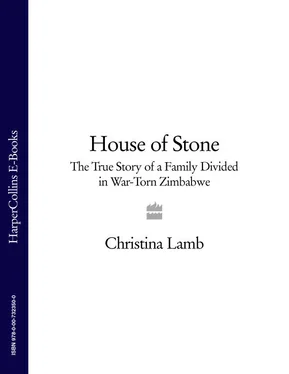Three years on, fewer than 300 white farmers remain on their farms. Yet it was never really a racial issue. Those of us in the Western media played into Mugabe's hands by initially portraying it as such, focusing on white farmers like the Houghs, perhaps because they seemed people like us. But the real victims were the hundreds of thousands of farm workers like Aqui who lost their homes and jobs. Many of them were beaten by marauding youth brigades who accused them of supporting the opposition and raped their wives or daughters while forcing them to sing pro-Mugabe songs. With nowhere else to go, they fled to the rural areas where they struggle to survive on wild fruits and fried termites.
My first visit to Zimbabwe was in 1994 when I was living in neighbouring South Africa. I was so taken with its beautiful scenery and friendly people that a few months later I went back on holiday with my husband-to-be. In those days, it was one of the most prosperous countries in Africa. We got giggling-drenched in the spray from Victoria Falls, drank gin-and-tonics as the sun set over the Zambezi and laughed at road signs warning ‘Elephants Crossing’ We sat awed by the silent grandeur of the Matopos Hills, burial place of Cecil Rhodes, empire builder after whom the country was originally named and a man who said, ‘I would annex the planets if I could.’
We also marvelled at an African nation with traffic lights that worked (even if they did call them robots), the pothole-free roads, neat brick schools everywhere, cappuccino bars and book cafés. It seemed a true Garden of Eden and the roads on which we travelled passed through a patchwork of lush green fields of tobacco, cotton and maize. They looked like model farms with combine harvesters gathering up neat bundles, long greenhouses full of neatly spaced roses, and rainbows playing through the water sprinkling from sophisticated irrigation systems.
Today Zimbabwe looks as if a terrible scourge has swept through. Some of the most advanced farms in the world have been reduced to slash and burn. The fields are charred and spiked with dead maize stalks or overgrown with weeds; the equipment has been plundered and stripped; and what little ploughing still goes on is by oxen or donkey. The country, which used to export large amounts of food, cannot even feed its own people. The destruction of the farms has left more than half of Zimbabwe's 12 million population on the edge of starvation and life expectancy has plummeted to around 30. The money is so worthless, with a loaf of bread costing 90,000 Zim dollars, that the country is returning to a barter economy.
In 2005, Mugabe switched his attention to the cities, targeting the urban population who had dared vote against him in successive elections. In the last week of May, I watched in shock as police bulldozers demolished thousands of homes, market stalls and small businesses. Operation Murambatswina or ‘Clean Up the Filth’ turned the country into an apocalyptic landscape wreathed with plumes of smoke and scattered with fleeing refugees clutching the scant belongings they had managed to salvage in bundles or on their heads. The few lucky ones had wardrobes or iron beds strapped onto wheelbarrows.
I have seen many dreadful things in my nineteen years of foreign reporting but nothing has affected me so profoundly as wandering through the smoking ruins of Mbare, the southern suburb of Harare that sprawls around Zimbabwe's oldest and largest market. My Lonely Planet guidebook recommends it as one of its five highlights of Harare and the place to see ‘colourful crowded scenes typical of Africa’. Instead, it looked as if a tsunami had passed through, reducing the famous market into drift-piles of smashed wood, twisted metal and broken bricks. The ground was awash with fruit and tomatoes trampled by the boots of Mugabe's henchmen, the ultimate indignity in a country where so many were starving.
Sirens wailed and newly acquired Chinese warplanes roared overhead to add to the fear. I walked around, careless of the fact that I was illegally in the country and that my white skin and fair hair were acting like a beacon to my presence, so stunned was I that a country's leader could do this to his own people.
A few figures were picking among the debris like vultures while others crouched in small dazed groups by the roadside. It was winter and the ground was hard and cold. The ubiquitous face of Robert Mugabe stared impassively up through the broken glass of a smashed picture. Ten or so women, two of them breastfeeding babies, squatted amid the rubble of what they told me had been the country's oldest chicken cooperative, founded in 1945. Further on, next to a pile of pink concrete and some torn magazine photos of celebrities, sat a large woman with elaborately beaded hair and a face that was crumpling inward. She tonelessly explained that the scattered debris was all that remained of her beauty salon, Glory's Hair Palace, which she had built up over many years. Glory was an extremely ample woman, jokingly known in the neighbourhood as Miss Universe. Her reputation for nimble weaving of hair, all the time dispensing sound advice about the male species (with frequent references to her own long-departed husband ‘the useless Blessing’), had enabled her to feed and educate her children.
A little further was a small fire around which huddled a terrified family with a daughter in a wheelchair. The mother, Memory, had the white flaking skin common among those who are HIV positive. ‘When they came with the bulldozers we told the police we have a disabled child, so please don't knock down our house’ she said. ‘They just said we don't care about the disabled and bulldozed our house and my husband's carpentry workshop and all his tools.’ Since then they had been sleeping in the open, and she showed me a seeping wound on her daughter's leg where she had been bitten by a rat.
None of these people were beggars or criminals. They had all been working for years to provide their families a decent life, only to find their homes and workplaces crushed to rubble in the name of ‘urban beautification’.
Along the railway line, past the National Foods factory, I came to Kambu Zuma suburb where police and militia had just arrived on their trucks and bulldozers. I stared aghast as people sat and did nothing while police took axes to their homes. Some of the houses were not shacks but two-storey concrete houses that took the bulldozers an hour to demolish.
Impatient with their slow progress, the police started ordering residents to destroy their own homes. Large fires were lit and people told to throw on their possessions. I watched hundreds of Zimbabweans, one of Africa's most educated populations, obediently smash and burn all they had ever worked for, leaving them with nowhere to live, no means to feed their children or pay their school fees.
I had made repeated trips to report on Zimbabwe since 1999 when the first farm invasion took place. Throughout the subsequent intimidation of the population and rigging of three elections, I had never understood why Zimbabweans did not rise up against their leader as people had in Yugoslavia or Ukraine. It irritated me that they kept asking why the outside world did nothing, when it seemed they were unwilling to help themselves. But at that moment in Kambu Zuma, watching people meekly burn their own belongings, I realized for the first time just how much twenty-five years of Mugabe's rule had oppressed the population. The next morning I had coffee with Nelson Chamisa, the youth leader of the opposition Movement for Democratic Change. Usually something of a firebrand, he stared into his cup, looking utterly defeated. ‘The people will never rise up now,’ he said, ‘Mugabe can do anything he likes to them.’
Afterwards when I returned home to London, I found myself waking in the middle of the night seeing those blank faces watching the bulldozers. I went to see Macbeth at the magical Wilton Music Hall in the East End and found Shakespeare's tragic hero portrayed as an African dictator as if to haunt me further.
Читать дальше












